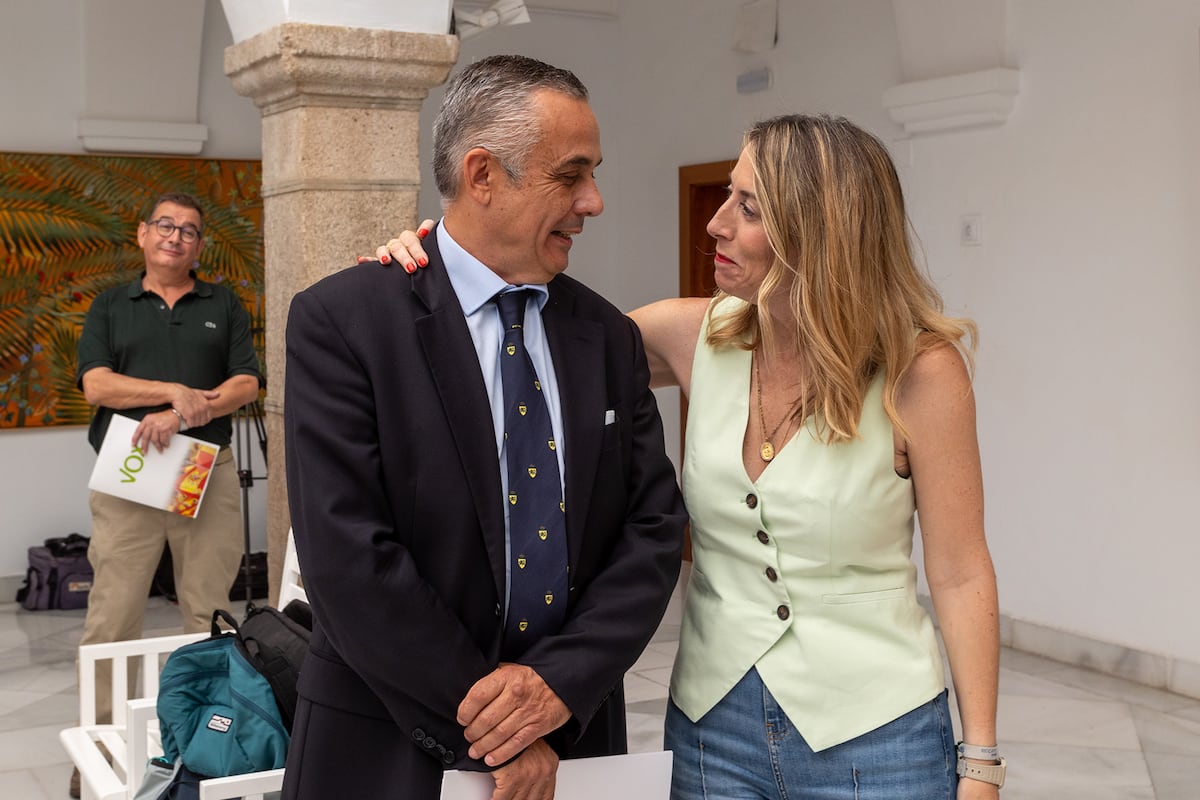Citizens decide this Sunday the political future in 12 autonomous communities: Community of Madrid, Valencian Community, Castilla-La Mancha, Aragon, Navarra, Extremadura, Murcia, Canary Islands, Balearic Islands, Asturias, Cantabria and La Rioja. In total, 17,335,748 voters were called to the polls to decide who directs the political destiny in these territories. In some communities the regional presidency will be settled by a handful of votes. In others, the winner will have to wait to close pacts to achieve the Government. These are the keys to the autonomies that are risking their political destiny for the next four years.
Community of Madrid
Madrid voters have been giving the regional government to the PP since 1995. On this occasion, 4,839,367 voters will decide the 135 regional deputies who will elect the tenant of the Royal Post Office Building, in the Puerta del Sol in Madrid, where the presidency of the community is. Isabel Díaz Ayuso is emerging as the winner of the elections, according to provisional results. The Madrid leader would not have secured an absolute majority, with almost 2% of the vote counted. Ayuso undergoes an exam because he has set the bar too high. And success is measured by expectations. The popular leader must demonstrate if she consolidates the strength achieved in the elections of two years ago and manages to get rid of the crutch of Vox or requires the support of Rocío Monasterio (Vox). The first results, still very preliminary, give Ayuso more than the 68 seats that determine the absolute majority in the regional Assembly. On the left, the Socialist candidate improves on the result recorded by his party four years ago and takes advantage of the candidate of Más Madrid, Mónica García, to lead the opposition for the next four years.
Check here the electoral results of the Community of Madrid
Community of Valencia
One of the hot spots of these regional elections of 28-M. The Valencian Community is one of the territories where the polls leave open the change of Government. A total of 3,606,314 Valencians will elect the 99 deputies of the Valencian Chamber who will decide if the current left-wing government is maintained after the Botánic pact that raised the socialist Ximo Puig. Valencia has been one of the most visited squares by the national leaders of the PSOE and the PP during the campaign. In any case, the popular leader, Carlos Mazón, would need the support of Vox to govern, according to previous polls. The absolute majority is located at 50 seats. The Valencian Community is one of the few territories where participation is being lower than in the past elections. At 18.00 had left his vote at the polls 58.18% of the census, almost a point and a half less than four years ago.
Check here the electoral results of the Valencian Community
Castile-La Mancha
Emiliano García-Page (PSOE) would be close to winning the elections, according to the first provisional results. The Socialist candidate would win about 17 seats with more than 10% of the vote counted. Page would be one step away from revalidating the absolute majority he garnered four years ago. A total of 1,553,573 La Mancha elect the 33 political representatives in the Castilian-La Mancha chamber to decide the political future of Castilla-La Mancha. Page has tried during the campaign to distance himself from national issues and has resorted to the water war to try to avoid the escalation of the popular candidate, Paco Núñez. The popular only scratches a couple of deputies, according to the provisional results. But Vox would enter the regional chamber with 4 seats. The socialist needs to win by a wide advantage, the majority is in the 17 deputies, before the electoral decline of Unidas Podemos in the region during the last electoral appointments. The purple formation would not obtain representation and Vox would add three deputies.
Check here the electoral results of Castilla-La Mancha
Navarre
UPN leads the elections in the autonomous community of Navarre, with 6.51% of the votes counted. The socialist María Chivite is playing her re-election at the head of the Government of Navarra. With the first provisional results, the socialist would leave one seat compared to the previous elections to achieve 10 seats in the regional chamber. EH Bildu would achieve the other big surprise of the night by achieving 11 deputies, according to the first provisional count. Vox would enter the regional parliament with two seats. A total of 489,458 Navarrese were called to the polls in this 28M to elect the 50 deputies of the Navarre Assembly. Chivite won the presidency of Navarra in 2019 thanks to the support of Geroa Bai and Podemos and the abstention of several deputies of EH Bildu. On the right flank, the parties that four years ago ran under the Navarra Suma brand (UPN, PP and Ciudadanos) are running separately. And Vox also aspires to achieve representation in the regional Parliament. The absolute majority is located in the 26 regional seats.
Check here the electoral results of the autonomous community of Navarre
Aragon
Spanish Ohio comes to the fore every time elections are held. The idiosyncrasy of the three Aragonese provinces make this Community one of the most observed by experts in demoscopy. The PP would win the elections in this autonomy, with 9% of the vote counted. The PP candidate, Jorge Azcón, would obtain 26 seats, 10 more than in 2019. A total of 979,395 voters are called this Sunday to the polls to elect the 67 deputies at stake. The socialist Javier Lambán is playing the presidency and, according to the provisional results, would obtain 24 seats, the same as four years ago when he came to power thanks to the support of the Aragonese Party (PAR) with the left of Podemos and the Chunta Aragonesista (CHA). Azcón (PP) could need the support of Vox, which would achieve 8 deputies, five more, to snatch the government from Lambán. The absolute majority would be decided from the 34 seats.
Check here the electoral results of Aragon
Asturias
The socialist Adrián Barbón caresses the victory in the current elections, according to the first provisional results. The Socialists would win 20 seats with more than 40% of the votes counted and repeat the result of the previous commissions. Barbón won the presidency of Asturias four years ago with a minority government, which has had the support of IU and sometimes Podemos and Ciudadanos. 835,451 Asturians were called to the polls to decide who are the 45 regional deputies in the regional Chamber. The popular candidate, Diego Canga, is improving on the results obtained five years ago. According to provisional results, it would win 16 seats in the Principality's chamber, six more than in 2019. The absolute majority will be decided from the 23 seats. Vox would also improve to achieve 4 seats, two more than in 2019, according to partial results.
Check here the electoral results of the Principality of Asturias
Cantabria
The government coalition formed by the Regional Party of Cantabria (PRC) and the PSOE ends the legislature shaken by the crisis of the Renfe trains. The opposition will try to retire Miguel Ángel Revilla (PRC), president between 2003 and 2011 and from 2015 until now, but the 80-year-old president lets himself be loved by the PP and opens to negotiate with all forces, except Vox.
Check here the electoral results of Cantabria
La Rioja
The PP, with almost 8% counted, would regain power, but would have to count on Vox to govern. The Socialists lose, for now, three seats and does not give the sum with Unidas Podemos to govern again. In 2019, the left-wing bloc (PSOE and Unidas Podemos) won its last seat, the decisive one, by just 735 votes.
Check here the electoral results of La Rioja
Extremadura
The Junta de Extremadura, with almost 5% counted, is still not at risk for the left, but as the polls anticipated, Vara does not get an absolute majority again and will depend on Unidas Podemos with three seats. Contrary to what happened in 2019, Vox, on this occasion, would enter Parliament.
Check here the electoral results of Extremadura
Murcia
The Region of Murcia was, in the middle of the legislature, the epicenter of a tsunami that dislocated the entire Spanish political chessboard by the motion of censure against the regional president, the popular Fernando López Miras. With 8%, the PP adds 20 seats, four more than in the previous election, and will be able to govern if it reaches an agreement with Vox that goes from four to nine seats. In this way, the PSOE has not governed in this community since 1995.
Check here the electoral results of the community of Murcia
Canary Islands
Ángel Víctor Torres (PSOE) hopes to revalidate the Executive he has led since June 2019 when he put an end to 26 years of nationalist governments of the Canary Coalition. The socialist is leading in the polls, with possibilities, even, to expand the 25 seats it has in the regional Parliament – composed of a total of 70. It will also depend, to revalidate the position, on what its government partners do at the polls: Nueva Canarias, which aspires to increase its representation, according to the polls; Unidas Podemos, to which the polls give a slight decrease; and Agrupación Socialista Gomera (ASG), which remains stable, benefiting from the overrepresentation that the Canarian electoral law grants to the five smaller islands.
Check here the electoral results of the Canary Islands
Balearic
In the Balearic Islands, with more than 11% counted, an alliance between the PP and Vox would end the progressive tripartite government formed by PSOE, Més per Mallorca and Podemos. The far-right party bursts in with eight seats and changes the board in this community.
Check here the electoral results of the Balearic Islands
Receive the bulletin Diario electoral, written by the deputy director of EL PAÍS Claudi Pérez. And here, all the live information of the 28M.


/cloudfront-eu-central-1.images.arcpublishing.com/prisa/WPWGX6DIRZA3DAQ7GEHRNPNOLQ.jpg)

/cloudfront-eu-central-1.images.arcpublishing.com/prisa/VS4RJNOL7ULGHTZDNQQRIWEYIA.jpg)
/cloudfront-eu-central-1.images.arcpublishing.com/prisa/NYNKKIEXBFHFFG6GV65QVUUAL4.jpg)
/cloudfront-eu-central-1.images.arcpublishing.com/prisa/USPGW4YAYJFFPIEU4G5GZEUJ4Q.jpg)


